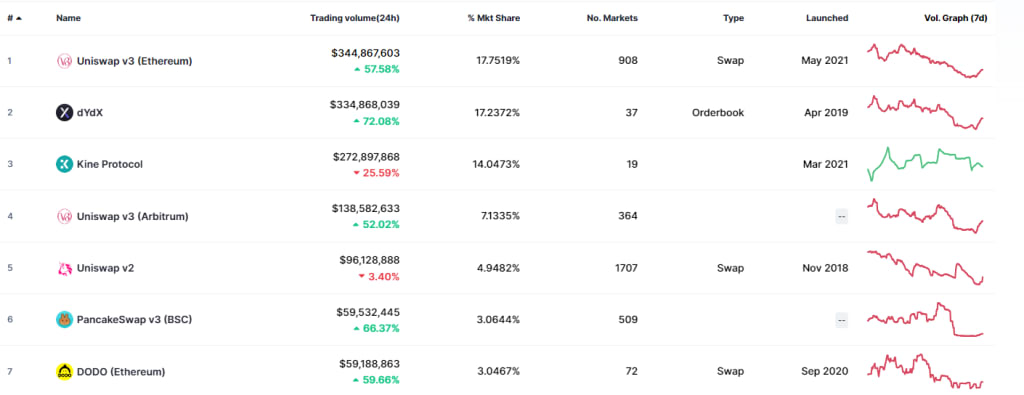Centralized vs. Decentralized Exchanges
Comparing different types of cryptocurrency exchanges

Introduction:
Cryptocurrency exchanges play a crucial role in the buying, selling, and trading of digital assets. They serve as platforms where users can exchange cryptocurrencies for other cryptocurrencies or fiat currencies. There are two primary types of exchanges: centralized exchanges (CEX) and decentralized exchanges (DEX). In this article, we will explore the differences between these two types of exchanges and the advantages and disadvantages they offer.
Centralized Exchanges (CEX):
Centralized exchanges are operated by a centralized entity or company. They act as intermediaries, facilitating the exchange of cryptocurrencies between buyers and sellers. Here are some key characteristics of centralized exchanges:
Control and Authority: Centralized exchanges have full control and authority over the platform. They manage user accounts, hold users' funds, and determine the rules and regulations for trading.
User-Friendly Interface: CEX platforms usually provide a user-friendly interface that is easy to navigate, making it accessible for both beginners and experienced traders.
Liquidity: Centralized exchanges generally have higher liquidity due to their larger user base. This means that users can execute trades quickly and at competitive prices.
Order Books and Matching: CEX platforms use order books and matching engines to match buyers and sellers. When a user places an order, it is matched with an opposing order from another user on the platform.
Security and Regulations: Centralized exchanges implement security measures, such as two-factor authentication and encryption, to protect user accounts and funds. They also adhere to regulatory requirements and may require user verification (Know Your Customer - KYC) to comply with anti-money laundering (AML) and counter-terrorism financing (CTF) regulations.
Advantages of Centralized Exchanges:
Higher liquidity, enabling faster trades and better price discovery.
User-friendly interfaces that are easy to navigate.
Customer support services provided by the exchange.
Availability of advanced trading features, such as margin trading and stop-loss orders.
Disadvantages of Centralized Exchanges:
Users need to trust the exchange with their funds and personal information.
Centralized exchanges are susceptible to hacking and security breaches.
Limited privacy, as users are required to provide personal information for verification purposes.
Potential for market manipulation by the exchange or third parties.
Decentralized Exchanges (DEX):
Decentralized exchanges operate on blockchain technology and enable peer-to-peer trading without the need for intermediaries. Here are the key characteristics of decentralized exchanges:
Non-Custodial Trading: DEX platforms do not hold users' funds. Instead, users retain control of their private keys and trade directly from their wallets.
Transparency and Trustlessness: DEX transactions are executed on the blockchain, providing transparency and eliminating the need to trust a centralized authority. Users have full control over their funds and can verify transactions on the blockchain.
Security: Since DEX platforms do not hold users' funds, the risk of hacking and security breaches is significantly reduced. Users are not exposed to the vulnerabilities associated with centralized exchanges.
Privacy: Decentralized exchanges prioritize user privacy, as users can trade without the need for identity verification. Users can maintain their anonymity, enhancing privacy and security.
Advantages of Decentralized Exchanges:
User control over funds and private keys, reducing the risk of theft or loss.
Enhanced privacy and anonymity, as users can trade without providing personal information.
Reduced reliance on centralized authorities, promoting decentralization and trustlessness.
Resistance to censorship, as transactions are executed on the blockchain.
Disadvantages of Decentralized Exchanges:
Lower liquidity compared to centralized exchanges, resulting in potentially higher slippage and slower trade execution.
Less user-friendly interfaces and limited trading features compared to centralized exchanges.
Lack of customer support services typically provided by centralized exchanges.
Limited trading options, as decentralized exchanges may have fewer trading pairs available.
Conclusion:
Centralized and decentralized exchanges offer different advantages and cater to different user preferences. Centralized exchanges provide higher liquidity, user-friendly interfaces, and advanced trading features but require users to trust the exchange with their funds. Decentralized exchanges prioritize user control, privacy, and security but may have lower liquidity and fewer trading options. Understanding the differences between these two types of exchanges is essential for cryptocurrency traders and investors to choose the exchange that aligns with their priorities and requirements.





Comments
There are no comments for this story
Be the first to respond and start the conversation.